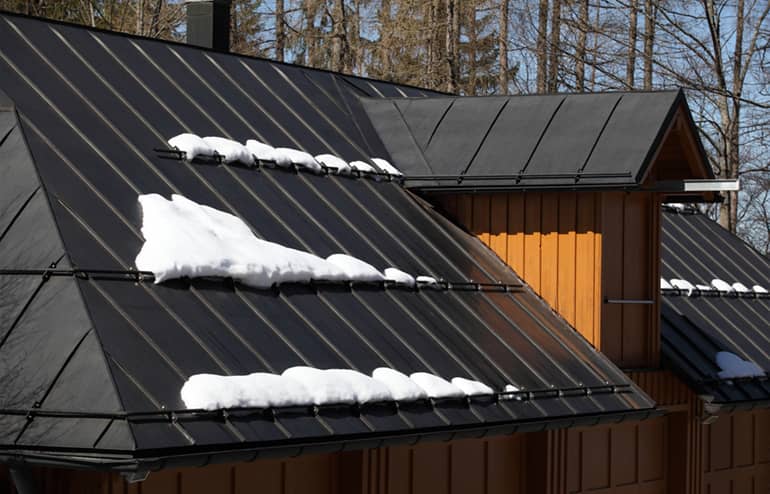
Dec
Choose Metal To Protect Your Home From Heavy Snow
While it doesn’t snow a lot in North Carolina like it does in New England, it’s still a consideration that should be explored when choosing the right roof for your Burlington home. That’s because heavy winter snow loads on roofing systems can cause big problems.
On top of that, you have to worry about ice dams, freezing temps and freeze/thaw cycles that can really take a toll on your Greensboro, NC roof. But the good news is, there are many materials that are up to the task of handling all that nasty weather. You’ll want to be on the lookout for a roofing material that:
- Is lightweight
- Can withstand heavy snow
- Is non-porous
- Is resistant to freeze/thaw cycles
- Offers proper ventilation
Did you know that snow can weigh as much as 20 pounds per cubic foot? That’s a lot of extra weight on your home, especially if you live in the mountainous regions of North Carolina. That heavy snow can lead to ice dams, which adds hundreds of pounds to the weight.
The Importance of a Lightweight Roof
Excessive roof weight can lead to warping and buckling. Therefore, the use of the heaviest roofing materials -- clay tiles and asphalt shingles – is not preferable when it comes to weight issues. For instance, truss failure can occur with too much weight, and additional reinforcements may be needed to withstand snow and ice accumulation.
Let’s compare the weights of common roofing materials:
- Metal Roofs: Weigh up to 1.6 lbs. per square foot
- Wood Shingles or Shakes: Weigh up to 4.5 lbs. per square foot
- Asphalt Shingles: Weigh up to 5 lbs. per square foot
- Clay or Concrete Tile: Weigh up to 10 lbs. per square foot
As you can see, metal roofing is the clear winner when it comes to lightweight properties and durability. That’s because this material adds reinforcing shear strength to the deck without the added weight. Plus, metal roofs are non-porous, so snow and ice will just slide right off before it’s allowed to accumulate.
The roof you choose should also resist freeze/thaw cycles. For this, you’re best off with a porous roof that won’t absorb water. When water freezes, it will expand, which puts more pressure on the roofing material. After it goes through several cycles of freezing and thawing, porous roofing materials will start to crack, split, deteriorate and warp.
Snow and ice can easily get through porous roofing materials and into the underlying roof deck, leading to buckling and warping of the deck. Traditional roofing materials, such as clay tiles, asphalt shingles and wood shakes, are porous and not the best choice for environments where it snows in the winter.
Because metal is non-porous and lightweight, it’s the best choice for Burlington NC homes.
Redeem Roofing Burlington, NC
Our Burlington NC roofers can help you decide on the perfect roof for your home – one that can withstand the cold, ice and snow! Get a free quote when you contact us at 336-350-1450. Roofing and siding experts in the Greensboro-Burlington Triad area
Travis came out to look at our roof very quickly and made the necessary repairs. He was very helpful, informative, and a pleasure to work with. Highly recommended.
- Category: Roofing
